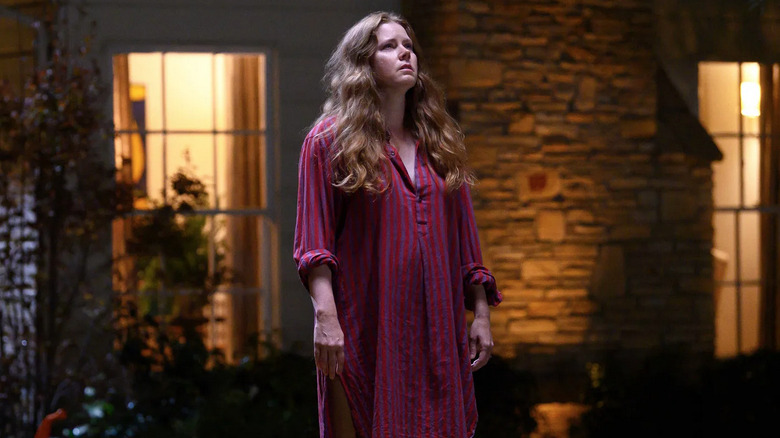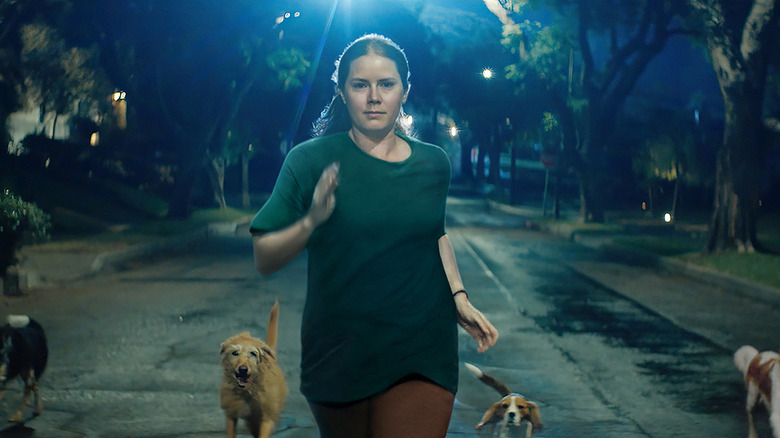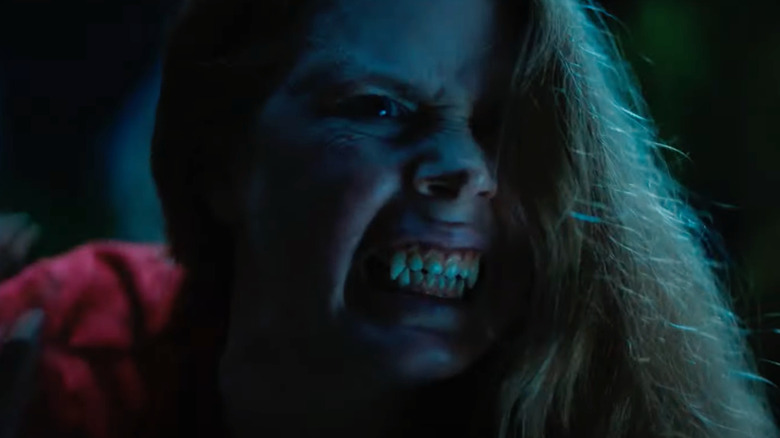Nightbitch Review: Amy Adams Elevates A Quirky Motherhood Metaphor [TIFF 2024]
- Amy Adams goes all in on her puppygirl era
- Humorously delivers strong messages about motherhood
- Easy to wish it went even weirder
- Pacing issues toward the end
Amy Adams' agent: you're safe for now. To announce that "Nightbitch" is the best film Adams has starred in since "Arrival" in 2016 might be to damn with faint praise, given the litany of disastrous failed Oscar-bait ("Hillbilly Elegy," "Dear Evan Hansen") and franchise mediocrities ("Justice League," "Disenchanted") that make up her film resume since then. But Marielle Heller's magical realist dramedy, based on the book of the same (amazing) name by Rachel Yoder, is a good time and a great showcase for the talent made moviegoers fall in love with Adams in the first place.
Playing a retired artist turned stay-at-home mother who responds to the pressures of parenting by transforming psychologically (and, at least from her perspective, physically) into a dog, Adams finds the right mix of brink-of-insanity theatrics and grounded feminist rage for a performance both hilarious and true. "Nightbitch" could plausibly earn Adams her seventh Academy Award nomination. Fans hoping for her first win, however, will have to wait longer. If a movie called "Nightbitch" is going to win Oscars, it would need to be on the level of an "Everything Everywhere All at Once" or a "Poor Things," the undeniable artistic accomplishment overcoming resistance to the weirdness. Adams' great performance aside, "Nightbitch" is just a good but not great movie — and oddly enough, its biggest obstacle to greatness might be that it's not quite weird enough.
An exploration of feral femininity
Without having read the book, Marielle Heller's screenplay for "Nightbitch" feels very novelistic in its constant stream of a heightened inner monologue. Amy Adams' Mother (none of the main characters have official names — something of a mini-trend at this year's TIFF with "The End," though the characters are much more fully-formed here) speaks to the audience about her frustrations and anxieties, sometimes in narration, other times directly addressing the fourth wall. Even when she's speaking with other characters, she'll slip in and out of her inner monologue's hyper-literary neurotic feminist language — often making for very funny dialogue when the film's aiming for comedy, though it can be a bit on the nose in more dramatic moments.
The big feminist points of "Nightbitch" — women are pressured to give up their careers to raise kids, society (American society in particular) doesn't appreciate the struggle of being a full-time parent, there's power in embracing suppressed feminine rage and one's "animal" nature — aren't going to come as huge revelations for those who think a lot about these issues. Even the canine metaphor isn't completely unique; people have been pointing out the similarities in premise to Marianna Palka's 2017 film "B*tch," predating the "Nightbitch" novel, since this film was first announced. But thinking of audiences for whom Greta Gerwig's "Barbie" served as an eye-opening Feminism 101 course, "Nightbitch" could be a similarly cathartic Feminism 102: Motherhood Edition.
Writer/director Heller has described "Nightbitch" as "a comedy for women, and a horror movie for men." I question whether reactions will be divided along such gendered lines. The overall tone clearly leans more towards comedy than horror, and while mothers will relate to the humor the most, the jokes are still funny even if you don't personally relate to the specific experiences. For almost all the parts of the movie that people might find scary — a disgusting growth through which Mother's "tail" comes in, one predictable but still upsetting animal death — I can't find a gendered component that would make them scarier to men. At most, I can imagine some men being more uncomfortable concerning a few jokes about periods.
Not wild enough?
The best parts of "Nightbitch" are whenever Mother embraces her wild side. My favorite stretch of the film involves her deciding to "play dogs" with her Son (played by twins Arleigh Patrick Snowden and Emmett James Snowden), turning her condition to her advantage and actually improving her parenting skills in a sing-along montage set to Weird Al Yankovic's "Dare to Be Stupid." A dinner with her old artist friends, where she sees how her perspective has drifted from her former peers (the one other mom in the group can afford a nanny), erupts in a comic freakout worthy of Nicolas Cage at his most demented.
Yet the lycanthropic wackiness ends up making up a smaller fraction of "Nightbitch" than you might expect. Rather than going full camp, this is ultimately just a few steps weirder than Marielle Heller's previous film, "A Beautiful Day in the Neighborhood" — the lightly stylized "Mr. Rogers movie" that was really about the sad journalist interviewing him. That was itself just a couple steps weirder than her preceding film, "Can You Ever Forgive Me?" — probably the calmest movie to ever fit the description of "be gay, do crimes." Heller's grounded comedies of depression keep getting slightly more offbeat, and I'm curious whether she'll continue escalating in her next film.
As the final act of "Nightbitch" gets further from the hook and more into Mother's struggling relationship with Husband (Scoot McNairy), it starts to run into that "Lord of the Rings: Return of the King" problem where too many scenes feel like they could be an ending and the film starts to drag despite being only 98 minutes. The ultimate ending, fortunately, is a good one, that seems like it will resonate with a lot of moms in the audience. Motherhood is a b*tch — and it's also a miracle.
"Nightbitch" premiered at the 2024 Toronto International Film Festival. It opens in theaters on December 6.


